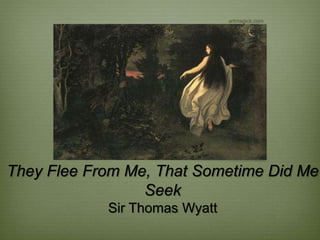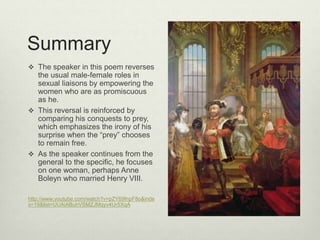6 they flee_from_me_
- 1. They Flee From Me, That Sometime Did Me Seek Sir Thomas Wyatt artmagick.com
- 2. Sir Thomas Wyatt 1503-1542 ? Wyatt served under the reign of King Henry VIII. ? Since the Tudor reign was enmeshed in infidelities as evidenced by the king, Wyatt most likely engaged in similar behavior (as this poem suggests). ? Wyatt was also rumored be Anne Boleyn's lover, for which he spent a month in the Tower of London until she was executed for adultery. (Boleyn was the king¡¯s second wife.) ? Over his lifetime, Wyatt was in and out of favor with the king and in and out of prison. ? His poetry, lyrics, and satires reflect his life¡¯s experiences.
- 3. o Wyatt , along with Henry Howard, the Earl of Surrey, is credited with introducing the sonnet; consequently, both men share the title ¡°father of the English sonnet.¡± o Wyatt wrote imitations of Petrarch¡¯s sonnets, one of which was Whoso List to Hunt after Petrarch¡¯s Una candida cerva; however, Wyatt¡¯s version refers to Anne Boleyn as the deer. o Wyatt successfully used other new forms, such as terza rima and the rondaeu.
- 4. They Flee From Me, That Sometime Did Me Seek They flee from me that sometime did me seek With naked foot, stalking in my chamber. I have seen them gentle, tame, and meek, That now are wild and do not remember That sometime they put themself in danger To take bread at my hand; and now they range, Busily seeking with a continual change. Thanked be fortune it hath been otherwise Twenty times better; but once in special, In thin array after a pleasant guise, When her loose gown from her shoulders did fall, And she me caught in her arms long and small; Therewith all sweetly did me kiss And softly said, ¡°Dear heart, how like you this?¡± It was no dream: I lay broad waking. But all is turned thorough my gentleness Into a strange fashion of forsaking; And I have leave to go of her goodness, And she also, to use newfangleness. But since that I so kindly am served I would fain know what she hath deserved.
- 5. Structure o The poem employs rime royal, a seven-line structure using iambic pentameter with the rhyme scheme ABABBCC. (Each stanza is like half of one sonnet.) o The tercet and couplets comprise lines 1-7 (ABA BB CC); the quatrain and tercet, are used in lines 8-14 and 15-21 (ABAB BCC). o The poem presents three key ideas.
- 6. Summary ? The speaker in this poem reverses the usual male-female roles in sexual liaisons by empowering the women who are as promiscuous as he. ? This reversal is reinforced by comparing his conquests to prey, which emphasizes the irony of his surprise when the ¡°prey¡± chooses to remain free. ? As the speaker continues from the general to the specific, he focuses on one woman, perhaps Anne Boleyn who married Henry VIII. http://www.youtube.com/watch?v=pZY69fnpF8o&inde x=19&list=UUAiABuhVSMZJMqyv4Ur5XqA
- 7. They flee from me that sometime did me seek With naked foot, stalking in my chamber. I have seen them gentle, tame, and meek, That now are wild and do not remember That sometime they put themself in danger To take bread at my hand; and now they range, Busily seeking with a continual change. Note ambiguity of pronoun. The ¡°foot¡± alleviates ambiguity of pronoun and suggestions the metaphor of a bird or animal (¡°stalking,¡± and ¡°gentle, tame, and meek.¡± The use of assonance and consonance reinforce the ease with which the women/doe ¡°flee.¡± Contrast of past and present behavior reflects speaker¡¯s wounded nature. The speaker derides women for ¡°fleeing¡± him¡ªfor remaining ¡°wild.¡± Ironically, he castigates these women for acting naturally (¡°seeking¡change¡±) for it was their natures that allowed him to enjoy their company. This enjambment highlights this division.
- 8. Thanked be fortune it hath been otherwise Twenty times better; but once in special, In thin array after a pleasant guise, When her loose gown from her shoulders did fall, And she me caught in her arms long and small; Therewith all sweetly did me kiss And softly said, ¡°Dear heart, how like you this?¡±Dialect reveals woman¡¯s power over speaker as the male seducer becomes the seduced. Fortune is personified to show speaker¡¯s awareness that his experiences with women were a result of luck, not devotion. Consonance of the letter ¡°t¡± reinforces the frequency of the visits when he believed that ¡°she¡± was devoted to him. ¡°It¡± is another ambiguous reference to the romantic visits (which were twenty times better). The reference is unclear. Diction, which is stressed by the syntax, reflects animal imagery. Alliteration stresses his memory of this one encounter, this one woman.
- 9. It was no dream: I lay broad waking. But all is turned thorough my gentleness Into a strange fashion of forsaking; And I have leave to go of her goodness, And she also, to use newfangleness. But since that I so kindly am served I would fain know what she hath deserved. Diction suggests that the woman is fickle. ¡°Kindly is used ironically and leads to his use of ¡°fain¡± as he infers she ¡°deserves¡± punishment, which is contrary to what a man in the same position would ¡°deserve.¡± Speaker notes that she took her role from him (¡°my gentleness¡±). This confuses him. Does she deserve kindness or punishment? He choses to ask the reader. He recognizes the woman as a person, not a bird/deer, but the reversal of their roles upsets him as ¡°It was not dream.¡± Speaker¡¯s tone could reflect Wyatt¡¯s affair with Anne or his wife¡¯s adultery. Final couplet betrays his emotional turmoil.
- 10. Tone The speaker¡¯s tone shifts from one of male arrogance to hurt pride. He questions the actions of a female who acted like a male, which leads to a bewildered tone on his part.
- 11. Works Cited ? http://www.enotes.com/topics/they-flee-from-me ? http://www.gradesaver.com/collected-poems-of-sir-thomas- wyatt/study-guide/section5/ ? http://www.humanities360.com/index.php/poetry-analysis-they- flee-from-me-by-sir-thomas-wyatt-8109/ ? http://www.luminarium.org/renlit/wyattbio.htm ? http://www.shmoop.com/they-flee-from-me/summary.html ? https://tspace.library.utoronto.ca/html/1807/4350/poem2407.ht ml
Editor's Notes
- #4: Terza Rima ¨C invented by Dante, a terza rima is composed of tercets woven into a rhyme scheme that requires the end-word of the second line in one tercet to supply the rhyme for the first and third lines in the following tercet. (aba, bcb, cdc, ded) Rondeau is characterized by the repeating lines of the refrain and the two rhyme sounds throughout the lyric.











